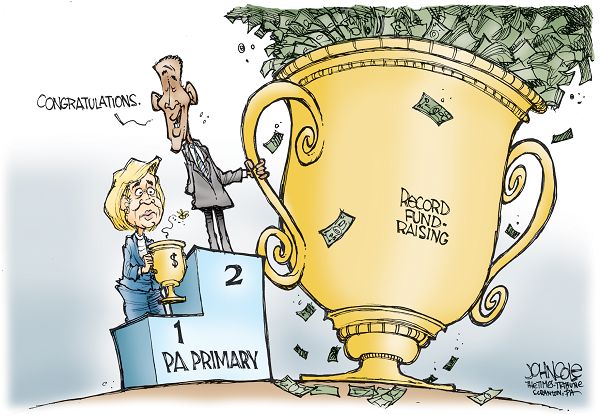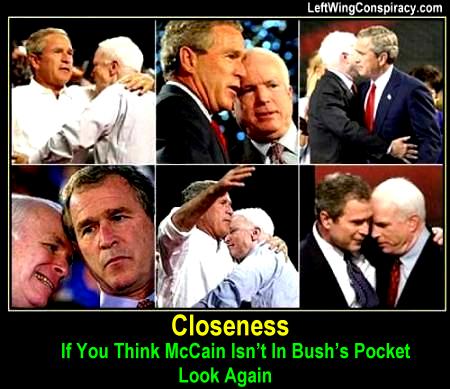
Bush Made Permanent
As the designated political heir of a deeply unpopular president according to Gallup, President Bush has the highest disapproval rating recorded in 70 years of polling John McCain should have little hope of winning in November. In fact, however, current polls show him roughly tied with either Democrat. Skip to next paragraph
Paul Krugman Columnist Page | Blog Related Times Topics: John McCain
In part this may reflect the Democrats problems. For the most part, however, it probably reflects the perception, eagerly propagated by Mr. McCain's many admirers in the news media, that he's very different from Mr. Bush a responsible guy, a straight talker.
But is this perception at all true? During the 2000 campaign people said much the same thing about Mr. Bush; those of us who looked hard at his policy proposals, especially on taxes, saw the shape of things to come.
And a look at what Mr. McCain says about taxes shows the same combination of irresponsibility and double-talk that, back in 2000, foreshadowed the character of the Bush administration.
The McCain tax plan contains three main elements.
First, Mr. McCain proposes making almost all of the Bush tax cuts, which are currently scheduled to expire at the end of 2010, permanent. (He proposes reinstating the inheritance tax, albeit at a very low rate.)
Second, he wants to eliminate the alternative minimum tax, which was originally created to prevent the wealthy from exploiting tax loopholes, but has begun to hit the upper middle class.
Third, he wants to sharply reduce tax rates on corporate profits.
According to the nonpartisan Tax Policy Center, the overall effect of the McCain tax plan would be to reduce federal revenue by more than $5 trillion over 10 years. That's a lot of revenue loss enough to pose big problems for the governments solvency.
- more -

When Senator John McCain serenaded reporters last April with his "Bomb Bomb Iran," I had to wonder. Was this a taste of his aging flyboy humor? Or was he telling us what to expect should he ever become president? We may never find out. If Vice President Dick Cheney has his way, he will beat McCain to the punch, possibly as soon as late May, after President George W. Bush returns from celebrating the 60th anniversary of Israel's creation.
The evidence is surprisingly public, though in several bits and pieces that fit together like a jigsaw. I hope that I'm wrong in how I've put the puzzle together, but here's how it looks to me.
On February 25 of this year, Cheney made a surprise visit to the Sultanate of Oman, a longtime military ally just across the Strait of Hormuz from Iran. He had come, an Omani official told The Associated Press, "to discuss regional security issues, including the US standoff with Iran over its nuclear program."
A little over three weeks later, Cheney returned to Oman as part of a ten-day visit to several countries in the region, including Israel, Turkey and Saudi Arabia. While in Oman, he gave an interview to Martha Raddatz of ABC News. "Can you foresee any point where military action would be taken?" Raddatz asked. Cheney tried to downplay the question, but Raddatz persisted, asking specifically about the National Intelligence Estimate (NIE), which concluded that Iran had shut down its nuclear arms program five years ago.
Cheney read the NIE differently. The Iranians definitely had a program to develop a nuclear warhead, which they apparently stopped in 2003, he insisted. "We don't know whether or not they've restarted." Cheney emphasized that the Iranians were continuing with their uranium enrichment, which - he said - would give them the fissile material to make nuclear weapons. He offered no evidence that the Iranian program would or could produce the highly enriched uranium they would need to make a bomb.
"VP: Iran May Have Resumed Weapon Program," the headlines ran. "Cheney: Iran might be next US target." The Israeli web site DEBKA added that Cheney was specifically talking about possible US military action in the region to shut down Iran's nuclear program.
Punctuating Cheney's remarks, the US Navy continues to build up its forces in the region, which now include two nuclear aircraft carriers and strike groups capable of attacking Iran or defending against missile attacks from Iran. America's military brass are also chiming in. The Pentagon is considering "potential military courses of action" against Iran, warns the nation's top military officer - Adm. Michael Mullen, chairman of the Joint Chiefs of Staff. "It would be a mistake to think that we are out of combat capability."
- more -
 U.S. Drug Enforcement Administration Authorities said the cocaine seized last month came in strawberry, coconut, lemon-lime and cinnamon flavors. Federal drug agents say candy-flavored cocaine is a new and troubling development and are hoping to keep it from spreading to the rest of the country after its recent emergence in California.
U.S. Drug Enforcement Administration Authorities said the cocaine seized last month came in strawberry, coconut, lemon-lime and cinnamon flavors. Federal drug agents say candy-flavored cocaine is a new and troubling development and are hoping to keep it from spreading to the rest of the country after its recent emergence in California.
Drug rings have occasionally sold cocaine mixed with candy powder, but investigators said the new product was significantly more sophisticated and lucrative. Cocaine cut with an added flavoring is less potent, but the 1 1/2 pounds seized last month were a full-strength powder into which strawberry, coconut, lemon and cinnamon flavoring had been chemically synthesized.
The flavored cocaine would command $1,100 to $1,400 an ounce on the street, the U.S. Drug Enforcement Administration said after DEA agents and state investigators seized the flavored drugs at two homes in Modesto, Calif. Regular powder cocaine, by comparison, fetches $600 to $700 an ounce, the agency said.
- more -
The lawyer for US vice-president Dick Cheney claimed today that the Congress lacks any authority to examine his behaviour on the job.
The exception claimed by Cheney's counsel came in response to requests from congressional Democrats that David Addington, the vice-president's chief of staff, testify about his involvement in the approval of interrogation tactics used at Guantanamo Bay.
Ruling out voluntary cooperation by Addington, Cheney lawyer Kathryn Wheelbarger said Cheney's conduct is "not within the [congressional] committee's power of inquiry".
"Congress lacks the constitutional power to regulate by law what a vice-president communicates in the performance of the vice president's official duties, or what a vice president recommends that a president communicate," Wheelbarger wrote to senior aides on Capitol Hill.
The exception claimed by Cheney's office recalls his attempt last year to evade rules for classified documents by deeming the vice-president's office a hybrid branch of government - both executive and legislative.
The Democratic congressman who is investigating the legal framework for the violent interrogation of terrorist suspects, John Conyers, has asked Addington and several other top Bush administration lawyers to testify. Thus far all have claimed their deliberations are privileged.
- more -

You simply can't pile up enough adjectives when it comes to the general, who, at a relatively young age, was already a runner-up for Time Magazine's Person of the Year in 2007. His record is stellar. His tactical sense extraordinary. His strategic ability, when it comes to mounting a campaign, beyond compare.
I'm speaking, of course, of General David Petraeus, the President's surge commander in Iraq and, as of last week, the newly nominated head of U.S. Central Command (Centcom) for all of the Middle East and beyond -- "King David" to those of his peers who haven't exactly taken a shine to his reportedly "high self-regard." And the campaign I have in mind has been his years' long wooing and winning of the American media, in the process of which he sold himself as a true American hero, a Caesar of celebrity.
As far as can be told, there's never been a seat in his helicopter that couldn't be filled by a friendly (or adoring) reporter. This, after all, is the man who, in the summer of 2004, as a mere three-star general being sent back to Baghdad to train the Iraqi army, made Newsweek's cover under the caption, "Can This Man Save Iraq?" (The article's subtitle -- with the "yes" practically etched into it -- read: "Mission Impossible? David Petraeus Is Tasked with Rebuilding Iraq's Security Forces. An Up-close Look at the Only Real Exit Plan the United States Has -- the Man Himself").
And, oh yes, as for his actual generalship on the battlefield of Iraq… Well, the verdict may still officially be out, but the record, the tactics, and the strategic ability look like they will not stand the test of time. But by then, if all goes well, he'll once again be out of town and someone else will take the blame, while he continues to fall upwards. David Petraeus is the President's anointed general, Bush's commander of commanders, and (not surprisingly) he exhibits certain traits much admired by the Bush administration in its better days.
- more -

Amid the din of the dueling democrats, people seem to have forgotten about that other guy in the presidential race - you know, John McCain. McCain is said to be benefiting from this politically because his rivals are tearing each other apart. In fact, few people are paying much attention to what the Republican nominee is saying, or subjecting it to any serious scrutiny.
On March 26, McCain gave a speech on foreign policy in Los Angeles that was billed as his most comprehensive statement on the subject. It contained within it the most radical idea put forward by a major candidate for the presidency in 25 years. Yet almost no one noticed.
In his speech McCain proposed that the United States expel Russia from the G8, the group of advanced industrial countries. Moscow was included in this body in the 1990s to recognize and reward it for peacefully ending the cold war on Western terms, dismantling the Soviet empire and withdrawing from large chunks of the old Russian Empire as well. McCain also proposed that the United States should expand the G8 by taking in India and Brazil - but pointedly excluded China from the councils of power.
We have spent months debating Barack Obama's suggestion that he might, under some circumstances, meet with Iranians and Venezuelans. It is a sign of what is wrong with the foreign-policy debate that this idea is treated as a revolution in U.S. policy while McCain's proposal has barely registered. What McCain has announced is momentous - that the United States should adopt a policy of active exclusion and hostility toward two major global powers. It would reverse a decades-old bipartisan American policy of integrating these two countries into the global order, a policy that began under Richard Nixon (with Beijing) and continued under Ronald Reagan (with Moscow). It is a policy that would alienate many countries in Europe and Asia who would see it as an attempt by Washington to begin a new cold war.
- more -

The silverbacks are grooming and posturing at the microphones.
Cammo and khaki, wall to wall. Bob Ireland, an Air Force psychiatrist and consultant to the Air Force Surgeon General, welcomes the audience to the Department of Defense's sixth annual Suicide Prevention Conference and makes jokes about how suicide prevention has been the DoD's bastard child, homeless and parentless.
In January 2008, the child nobody wanted finally managed to find a home. The Defense Center of Excellence for Psychological Health and Traumatic Brain Injury assumed responsibility for an issue and an injury that the military has hidden and denied for generations.
It's been left up to Lt. Col. Steven Pflanz, the senior psychiatry policy analyst for the Air Force surgeon general, to report on the mental healthcare practices that have been developed for those on active duty. Kerry Knox, director of the VA's Center for Excellence on Suicide Prevention, was scheduled to share with him these introductory remarks, but is not in attendance. Apologies are made, but no one mentions how obviously difficult it would be for her to get into the self-congratulatory HOOAH! spirit of this conference when her boss just got busted big time for hiding VA suicide statistics, not just to the media but to Congress as well.
"Shh!" Ira Katz, the VA's mental health director, coyly began an email to the agency's chief communications director -- and inconveniently made public just this week. "Our suicide prevention coordinators are identifying about 1,000 suicide attempts per month among the veterans we see in our medical facilities. Is this something we should (carefully) address ourselves in some sort of release before someone stumbles on it?"
Ach, Katz, you little schemer.
- more -

In a Washington Post discussion yesterday, Post reporter Shailagh Murray inadvertently admitted that the media is currently scrutinizing Sen. John McCain (R-AZ) less than they potentially could:
Q: Will we see more scrutiny of his campaign finances and practices, or will Obama/Wright continue to suck up all the oxygen?
MURRAY: This is driving Democrats crazy right now, but just wait. Once the primary battle is over, Sen. McCain will get his fair share of scrutiny.
Asked about the statement from Murray in his weekly discussion, the Post’s Howard Kurtz said this attitude is the wrong one:
KURTZ: We don’t have unlimited resources, but I think we need to be covering McCain as vigorously now as in the fall. I mean, it’s not like he’s laying on a beach somewhere, he’s out there campaigning. One pet peeve of mine is when reporters don’t cover an issue because the candidates are avoiding it, thus allowing them to set the agenda.
- more -

Well, it looks like Dafydd ab Hugh and Orson Scott Card have competition for the title of Most Obnoxious Right-Wing Sci-Fi Melvin:
Now a fixture at Department of Homeland Security science and technology conferences, SIGMA is a loosely affiliated group of science fiction writers who are offering pro bono advice to anyone in government who want their thoughts on how to protect the nation.
The fact that my tax dollars are going to buy juice and cookies for these schmendricks makes me feel all warm inside.
The group has the ear of Department of Homeland Security Undersecretary Jay Cohen, head of the science and technology directorate, who has said he likes their unconventional thinking.
“There’s no idea so asinine that this administration won’t give it serious consideration,” said Cohen, just before his meeting with Gene Ray of Timecube.
Members of the group recently offered a rambling, sometimes strident string of ideas at a panel discussion promoting the group at the DHS science and technology conference.
Rambling, you say? Strident? Could you provide an example?
Among the group’s approximately 24 members is Larry Niven, the bestselling and award-winning author of such books as “Ringworld”. Niven said a good way to help hospitals stem financial losses is to spread rumors in Spanish within the Latino community that emergency rooms are killing patients in order to harvest their organs for transplants.
I…uh…well! That’s, uh, that’s rambling and strident all right!
- more -
What does freedom mean to you? In six words, it seems like such a simple question. The answer becomes more elusive as we search closer for its meaning. Put simply, the Toronto Freedom Festival believes that freedom entails an individuals right to choose for oneself. However, in order to accurately make any decision in any area of our lives - we must be responsible as human beings and know all of the facts. It is with this notion in mind that I welcome you to the 2nd Annual Toronto Freedom Festival and encourage you to enjoy an idea-provoking experience, offering thoughtful and passionate groups a forum to expose their ideas, and facts, of how they express their ideas to thousands of other forward-thinking individuals.
So what do we have in store for you? In maintaining the TFF vision of Freedom, an explosion of talent, awareness, innovation and passion will scatter across Queens Park on Saturday, May 3rd. Our Speak Free stage will present the words and wisdom of important figures in our community including Canada's renowned Prince of Pot, Mark Emery, CHRY News Now host and spoken word artist, Lady Loxx, Law Enforcement Against Prohibitions Alison Mryden, Nora Wolf, Reiki Master, meditation leader and many more. Waxing philosophic on topics such as the freedom to not be extricated, freedom of expression, freedom from bad prohibition, freedom to party responsibly and the freedom to be, our presenters will encourage festival goers to respect ones right to speak freely.
I am incredibly proud to announce that TFF has partnered with the iconic Tommy Chong to express some of his ideas about freedom. TFF will be screening Tommy's engaging documentary a/k/a Tommy Chong, which tells his enraging story of being targeted during the U.S. War on Drugs and how and why he was arrested and ultimately put in jail for nine months.
Tommy's story is symbolic of our struggle for that ever-elusive state of being: freedom. If you are not outraged at something, you're doing something wrong.
- more -
RIP Albert Hofmann









